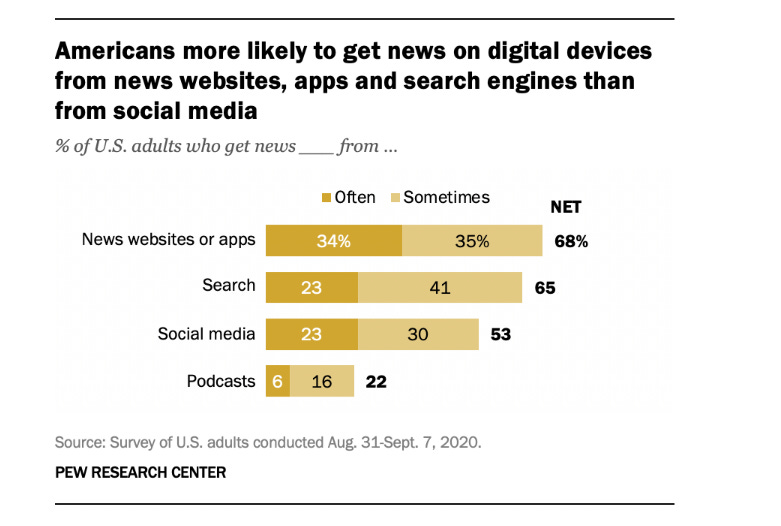American Democracy's Internet Problem
What does James Madison have to do with Twitter's Community Notes?
Welcome to Musket Philosophy.
This is a blog where we talk about the psychopolitics of modern America through the eyes of history, with many references to the founding fathers.
Today I plan to assail Federalist #10. No harm meant to James Madison, of course, and there are about eighty others that still ring true today, but something about #10 did not sit right with me. Here’s what that is.
The Social Contract has expanded
The world is a series of interconnected systems that all function in unison, from your local bar and all of its suppliers to the United States government and foreign policy around the world to the post office. Everything functions as a part of a grander system. For this very reason, the media has been called the fourth branch of government, as it is intended to check the government.
Increasingly so, it is clear that there is now a fifth branch of government that serves a crucial role in the governments of the world, and it controls what Jean-Jacques Rousseau actually called a form of law in The Social Contract, that is, public opinion.
If public opinion is a form of law, and it often does dictate social morals, then the power to control it is the power to control a civilization.
If this is true, then social media is the fifth estate of democratic government, and ignoring this is sure to lead to the ruin of all the Modern West and to lead us into a technototalitarian state in which the extent of control of government will far surpass anyone’s wildest nightmares.
So, what exactly does this have to do with Federalist #10?
The hole in James Madison’s formulation of democracy
Perhaps one of the best lines in the Federalist Papers is this line by Madison that illustrates a deep psychological truth.
The latent causes of faction are thus sown into the nature of man.
This simply means that the causes of “faction,” aka party politics, are inherent to humans, meaning they are driven by our emotions. The worst form of party politics is when passions are whipped up, and people are driven into a frenzy to make decisions they would not otherwise have made if they had been able to sit back, chill the hell out, and use their reasoning skills.
Madison wages a full-frontal assault on party politics, saying that it is “the mortal disease by which popular governments everywhere have perished.”
All of this is good, fine, and dandy. It’s all exactly true. The emotional rage of humans is what destroys our ability to work together and form a civil society. There is a problem you may be starting to see develop here. There is something about Madison’s time that made his arguments about faction more relevant there than right now. Madison’s conception of how a democracy of functions, as written in Federalist #10, no longer applies now, and here’s why.
He asserts that America will be able to easily avoid party politics because of the grand distances of our republic. It will ensure bad actors are unable “to act in unison.”
He says that due to the great distances between states, people will be less likely to fall into a “rage for paper money, for an abolition of debts, or an equal division of property.”
Lol, there, am I right?
All of these arguments work in a society where the fastest form of cross-country communication takes weeks on horseback. Now a raging mob can be whipped up in minutes. The internet serves as a breeding ground for instantaneous witch trials. Think about how quickly Scott Adams was canceled. Think about how much rage flies around the internet every day via the activists on Twitter. Think about how quickly false information spreads on the internet. It’s an absolute nightmare for democracy.
Dare I say. It’s nearly incompatible with the form of democracy suggested by James Madison.
The reversal of decentralization, the Bane of the internet
There may be a saving grace here. The original fantasy of the internet was decentralized information dissemination for everyone. Equal access to knowledge for all with an internet connection. While this has changed with mainstream media outlets taking over the dissemination of news on the internet via the centralization of internet traffic on social media, there is still a way to maintain the decentralization of knowledge.
Twitter is doing a damn good job of it so far via community notes. It’s been hilarious so far, as multiple very mainstream outlets have been fact-checked by the community, and embarrassingly so. Reuters was fact-checked a few days ago.
This brings up an interesting idea raised by The Rabbit Hole called Trust as a Service.
Essentially, what social media offers to us is a way to connect and communicate with others. For many of us, it functions as our main source of news. According to Pew Research, in 2021, the majority of people still get their news directly from the source, so from the website, but nearly a quarter of people get their news from social media. This number will only continue to increase.
There is something this chart doesn’t mention, which is that search engines often prioritize news websites over social media, and rightfully so, as it is “directly from the source.”
The problem with the idea is that over the past couple of years, we’ve become increasingly aware of the disorder on social media and of the willingness of mainstream news organizations to lie. This became incredibly obvious during the Twitter Files saga, which revealed how Twitter pre-Musk had censored conservatives and actively targeted its political enemies. Noticeably during that timeframe, mainstream media was nearly silent on the issue. Most noticeably, the New York Times, the Newspaper of Record, didn’t seem to care.
Whether that means they are complicit or not, I will leave to speculation, but one thing is for damn certain, that was the most important story in the nation at the time, and they completely ignored it.
But Twitter was all over it.
Now all of this is great. People can find the news they need to know quickly, but how can Twitter and other social media apps ensure that they are a good source of information? After all, haven’t the Twitter Files shown that the route of “fact-checking” is a dangerous one to go down?
Twitter’s Community Notes is a start. The ability of the people to actively fact-check the reality of the situation is one and the beautiful thing about Community Notes is that it is filled with redundancies.
Redundancies are the shining star of our constitution, perhaps the most beautifully woven tapestry of government ever created, and they should be the shining star of healthy information dissemination. More on community notes shortly…
And then there’s the problem of emotional manipulation by social media companies. Earlier in this post, I said that the power to dictate social morals is the power to control civilizations. Which begs the question, how are social morals enforced?
Classic behaviorism, of course. In this way, the internet hyperbolically exploits our negative feelings in two ways:
Social media algorithms often prioritize novel or explosive things, and they are encouraged by those little red hearts called likes, which function as currency in the minds of humans. Dopamine currency, that is. This encourages news organizations to say inflammatory and often misleading things as opposed to telling the full story.
When engaging in the targeting of an individual with negative comments, mass reporting attacks, or else wise, you know what you’re doing is wrong, but often there is no “negative” social enforcement, as there might be in a parallel real-life scenario, all you see are tons of other people commenting saying negative things, and thus you’re reinforced into your bad behavior.
So, how do we combat the prolific misinformation spread by mainstream media and the negative behavioral loops that are being exploited to maximize the ad dollar revenue of social media?
How to solve America’s Internet Problem
Twitter’s Community Notes is a great start.
Myth Pilot, a fantastic Substack writer, summed this up so perfectly that I need not say much more than he already has on the topic.
The mainstream media derives much of its power from its illusion of objectivity. Even when they print headlines that are inflammatory or designed to obfuscate the truth, they carry the weight of authority because, for many decades, they have been trusted as neutral fact-finders. Today, long after they have abandoned the practice of objectivity, they are still content to enjoy the benefits of the trust and authority associated with it. Therefore, in order to denude the media of its power, their biases and inaccuracies must be exposed wherever possible. Ideally, there should be a Community Note on every single Tweet made by a MSM organization. This will degrade their reputation in the public sphere and put them on the defensive.
Community notes presents a model for all social media. It should be noted that Myth Pilot makes another fantastic point in this piece, saying, “Community Notes could quite literally save some city from burning down the next time the media attempts to incite riots using false reporting.”
Make no mistake, the problems of behaviorism are known by both social media giants and mainstream media giants. They should be penalized for this behavior. In order to do this, behaviorism should be used against them, and here’s how:
If a news organization or journalist consistently posts incendiary false information that gets popped by the community, they should be penalized, and this penalization should NOT come from Twitter or the social media company itself. It should come for those who participate in Community Notes and should be put up for a decentralized vote. The punishment could come in the form of reduced reach, being quote tweeted by community notes, being publicly embarrassed, and being informed that their account is under watch. Repeated false statements about matters of public importance should result in suspension, again, which is decided upon by Community Noters.
This methodology could be adopted by all social media companies to limit the spread of bad information in a democratic way. You know what they say about the voice of the people.
There are a few other problems that need addressing as well, which I’ll cover shortly.
Polls are a great way to gather information about how the public feels about something but are prone to bot attacks. Polls on Twitter are incredibly easy to use and require only one click. But how do you ensure you’re not getting bot attacked? Easy, require one more click to prove you are not AI. A simple verification will do.
Mass reporting is another problem that could be solved by the community noters model. Running a suspicious tweet through a series of decentralized community noters who are put to a vote to see if they agree with the characterization of the mass reporting could easily answer the question for the people.
Incentivizing good Samaritans to safeguard our social media and to participate in being a good community noter is simple. Pay them or give them things of value. For consistent community noters, either monetarily reimburse them for their efforts or give them access to premium content for free.
The solution to nearly all of the problems of social media, in a way, is similar to what James Madison foresaw as the way to stop political wildfires. The idea is the same. Slow down the information flow, analyze it, and ensure it is not emotionally driven but rather driven by reason.
Humbly and sincerely to my friends and enemies,
Musket out.






